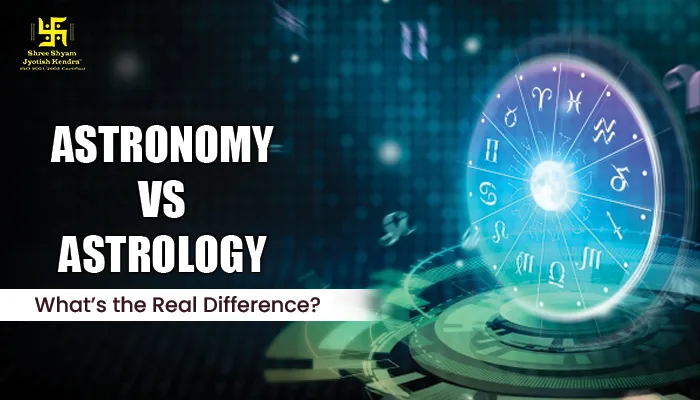 Have you ever stared at the night sky and wondered if the stars are just distant suns—or if they have something to say about your life? That simple question lies at the heart of a centuries-old debate: astronomy vs astrology. They may sound similar, but they walk very different paths. One is grounded in science, the other in symbolism. Yet both began their journey in the same place—under the stars.
Have you ever stared at the night sky and wondered if the stars are just distant suns—or if they have something to say about your life? That simple question lies at the heart of a centuries-old debate: astronomy vs astrology. They may sound similar, but they walk very different paths. One is grounded in science, the other in symbolism. Yet both began their journey in the same place—under the stars.
Let’s explore how these two fascinating fields came to be, how they evolved, and why understanding the differences between astronomy and astrology can open your mind to both science and spirit.
Astrology and Astronomy: Exploring Their Interlinked Worlds
Long before telescopes and zodiac charts, our ancestors looked up at the sky for answers. The origin of astronomy and origin of astrology can both be traced back to ancient civilizations like Mesopotamia, Egypt, China, and India. People noticed patterns in the stars, seasons, and celestial events—and believed these cosmic clues held meaning.While astrology focused on interpreting these patterns to understand human life and fate, astronomy emerged from the same practice but with a more observational, calculative lens. Back then, the astrologer and astronomer were often the same person. Astrology was used to predict natural events, harvest cycles, and even royal decisions. Astronomy, though also primitive at the time, was more concerned with celestial mechanics and navigation.
Top 5 Differences Between Astronomy and Astrology
Over time, the roads began to split. Let’s look at the core differences between astronomy and astrology:- Foundation: Astronomy is based on science and physics; astrology is symbolic and intuitive.
- Purpose: Astronomy seeks to understand the universe; astrology seeks to understand human behavior and destiny.
- Tools: Astronomers use telescopes and data; astrologers use birth charts and planetary positions.
- Perception: Astronomy is considered science; astrology is viewed as metaphysical.
- Recognition: Astronomy is studied in universities; astrology is practiced for personal insight and spiritual guidance.
One asks how the universe works, the other asks what it means for us.
History of Astronomy: From Ancient Observations to Telescopes
The history of astronomy is one of curiosity, challenge, and discovery. From early sky maps in Babylon to the heliocentric model proposed by Copernicus, the field has transformed through breakthroughs by figures like Galileo, Newton, and Hubble.What began as tracking seasons and eclipses evolved into a full-blown scientific discipline. Today, astronomy drives space exploration, satellite communications, and our understanding of the cosmos. It has answered questions once thought impossible and continues to unravel mysteries like black holes and dark matter.
The Evolution of Astronomy: Milestones in Space Exploration
The evolution of astronomy has been defined by major leaps:- Telescope invention (1600s)
- Newtonian laws of motion and gravity
- Einstein’s theories of relativity
- The Hubble Space Telescope
- Modern space missions like James Webb Telescope
The Origin of Astronomy: When Did Stargazing Begin?
The origin of astronomy likely began when early humans first noticed the regularity of the Moon, Sun, and stars. They realized these celestial bodies affect tides, seasons, and timekeeping. Stone monuments like Stonehenge and ancient observatories in India and Mesoamerica prove just how important stargazing was to early civilizations.These ancient astronomers helped set the foundation for calendars, navigation, and agricultural cycles. Without their curiosity, we may never have developed the scientific methods we use today.
A Deep Dive into the History of Astrology
The history of astrology runs parallel to human civilization itself. From Mesopotamian omen-based predictions to ancient Indian astrology (Jyotish Vidya), this system has guided everything from kings’ decisions to farmers’ planting cycles.In India, astrology is still central to many traditions—birth chart analysis, Kundli matching, Muhurat selection, and more. It’s deeply tied to belief systems and continues to be a trusted guide for many, especially in uncertain times.
While its place in the academic world may have faded, astrology’s spiritual relevance has remained strong.
Tracing the Origin of Astrology Across Cultures
Just like astronomy, the origin of astrology spans across continents. It emerged independently in Babylon, Greece, China, and India. Each developed unique systems:- Babylonian astrology gave us the zodiac.
- Greek astrology introduced horoscopic techniques.
- Chinese astrology relied on lunar cycles and elemental signs.
- Indian astrology emphasized karma, planetary periods (Dasha), and Nakshatras.
The Evolution of Astrology: From Omens to Horoscopes
The evolution of astrology has brought it from omens carved in stone to digital horoscopes on your phone. Yet, its essence remains the same: to help us understand ourselves and our place in the universe.Modern astrology blends ancient wisdom with psychology and personal development. It is now a tool for mindfulness, therapy, and empowerment. Whether it’s Mercury retrograde memes or in-depth natal chart readings, astrology continues to resonate across generations.
Curious what your stars reveal about your career, love, or destiny? Speak to Pt. Pawan Kaushik — the best astrologer in India and trusted guide for over three decades.
Also Checkout our thoughts on Astrology vs Numerology: What’s the Real Difference?

Conclusion: One Universe, Two Ways of Seeing It
So, what’s the best between astrology vs astronomy? The answer depends on what you seek:- Do you want scientific understanding? Look to astronomy.
- Do you seek meaning, guidance, or introspection? Turn to astrology.
Ready to align your inner cosmos with the stars above? Book a session with Pt. Pawan Kaushik — the No.1 astrologer in Delhi is known widely to offer clarity, confidence, and effective guidance to its clients.
One Sky, Many Interpretations. Whether you follow astrology or astronomy, one thing is certain—we all look at the same sky. The difference lies in what we choose to see. Some see science. Others see signs. Some see facts. Others see faith.
 +91 9990176000
+91 9990176000 +91 9999097600
+91 9999097600
 CALENDAR 2026
CALENDAR 2026





